| Srl | Item |
| 1 |
ID:
107084
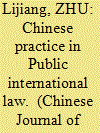

|
|
|
|
|
| Publication |
2011.
|
| Summary/Abstract |
This survey covers materials reflecting Chinese practice in 2010 relating to: I. Fundamental principles of international law (Five principles of peaceful coexistence; Rule of law at the national and international levels); II. International law of treaties (Effects of armed conflicts on treaties; Mr. HUANG Huikang elected as member of the International Law Commission (ILC); China-DPRK Treaty of Friendship, Cooperation and Mutual Assistance); III. China's territorial integrity (China's core interest; Taiwan; Tibet; Diaoyu Island and its affiliated islands; Xisha Islands; Nansha Islands); IV. International law of the sea (General position; Development of the Chunxiao oil and gas field in the East China Sea; Military activities in the Yellow Sea; Freedom of navigation in the South China Sea; Nature of the Douglas Reef (Okinotori Reef); Somali piracy); V. International law on civil aviation (Beijing Convention and Protocol on Aviation Security); VI. International human rights law (General position on human rights; Racism and self-determination; Human organ transplantation; Freedom of information; Call for repatriation of Uighur terrorist suspects in Guantanamo to China; Expulsion of aliens; North Korean asylum seekers; UN High Commissioner for Refugee (UNHCR); Human Rights Council; Implementation of human rights instruments); VII. International humanitarian law (Protection of civilians in armed conflicts; Occupied Arab territories; Humanitarian assistance; The 1972 Sino-Japan Joint Statement); VIII. International law on disasters (Protection of persons in the event of disasters); IX. International law on arms control, disarmament and non-proliferation (General position; Ratification of CCW Protocol on Explosive Remnants of War); X. International criminal law (The International Criminal Court (ICC); The Bashir case; Scope and application of universal jurisdiction; Measures to eliminate international terrorism; Ratification of the International Convention for the Suppression of Acts of Nuclear Terrorism; Bilateral treaty on extradition with Indonesia; The Park Joo-tark extradition case; Hacking and other cyber attack; Transnational organized crime; International drug control; Anti-corruption); XI. International environmental law (Climate change; Prevention of transboundary harm from hazardous activities and allocation of loss in the case of such harm; Use of water resources of Mekong River); XII. International law on diplomatic and consular relations (Vienna Convention on Diplomatic Relations and Vienna Convention on Consular Relations; Responsibility of States to ensure protection of diplomatic personnel and premises; Diplomatic asylum; Ratification of bilateral consular agreements with the Philippines and Cambodia; The Rio Tinto case and bilateral consular agreement with Australia); XIII. International law on international organizations (Role of UN and its reforms; UN peacekeeping operations; Regional cooperation of Northeast Asia); XIV. International law on settlement of disputes (Shelling of Yeonpyeong Island incident; International Court of Justice (ICJ); Kosovo advisory case before the ICJ; Ms. XUE Hanqin Elected as Member of the ICJ).
|
|
|
|
|
|
|
|
|
|
|
|
|
|
|
|
| 2 |
ID:
109205
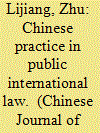

|
|
|
|
|
| Publication |
2011.
|
| Summary/Abstract |
This part supplemented materials reflecting Chinese practice in 2010 relating to: I. International Law of the Sea (Responsibility and Obligations of States Sponsoring Persons and Entities with Respect to Activities in the International Seabed Area; Arctic Cooperation); II. International Law on Outer Space (Peaceful Use of Outer Space); III. International Criminal Law (Crime of Aggression); IV. International Environmental Law (Climate Change).
|
|
|
|
|
|
|
|
|
|
|
|
|
|
|
|
| 3 |
ID:
141487
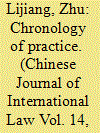

|
|
|
|
|
| Summary/Abstract |
This survey covers materials reflecting Chinese practice in 2014 relating to: fundamental principles of international law (five principles of peaceful coexistence); sources of international law (identification of customary international law); China's territorial integrity (Tibet; Diaoyu Island and its affiliated islands; Xisha Islands; Nansha Islands; China-India Memorandum of Understanding on Hydrological Data Sharing on the Yaluzangbu River; China-Pakistan agreement on border ports and their management system); international law of the sea (contracts with International Seabed Authority); outer space law (updated Text of Draft Treaty on Prevention of the Placement of Weapons in Outer Space and of the Threat or Use of Force Against Outer Space Objects; non-legally binding United Nations instruments on outer space); international cyperspace law (international law in cyberspace); aliens (expulsion of aliens); international human rights law (general positions on human rights; Human Rights Council; Office of the High Commissioner for Human Rights; International Covenant on Economic, Social, and Cultural Rights; Convention on the Elimination of All Forms of Discrimination against Women; human rights treaty bodies; right of self-determination; death penalty; rights of indigenous peoples); international humanitarian law (status of the Protocols Additional to the Geneva Conventions of 1949; protection of civilians in armed conflicts; protection of humanitarian workers in armed conflicts; Japan's forceful draft of “comfort women” during WWII; children and armed conflict); international law on disasters (protection of persons in the event of disasters; humanitarian and disaster relief assistance); international law on arms control, disarmament and non-proliferation (nuclear disarmament and non-proliferation; Chemical Weapons Convention; Biological Weapons Convention; Convention on Certain Conventional Weapons; Amended Protocol II to the CCW; Protocol V to the CCW (Explosive Remnants of War); improvised explosive devices; Convention on Cluster Munitions; Arms Trade Treaty; small arms and light weapons); international criminal law (International Criminal Court; scope and application of universal jurisdiction; the obligation to extradite or prosecute (aut dedere aut judicare); immunity of State officials from foreign criminal jurisdiction; UN Convention against Transnational Organized Crimes; ratification of Convention against Terrorism of the Shanghai Cooperation Organization; ratification of the treaties on extradition with Iran and Afghanistan; ratification of the Treaty on Mutual Judicial Assistance in Criminal Matters between China and Argentina; completion of negotiation and initialing on the Treaty on Judicial Assistance in Criminal Matters between China and Sri Lanka; initialing of the Treaty on Mutual Assistance in Criminal Matters and the Treaty on Extradition between China and Grenada); international environmental law (Doha Amendment to the Kyoto Protocol; protection of atmosphere; updated Measures for the Administration of Import and Export of Ozone Depleting Substances); law on diplomatic and consular relations (effective measures to enhance the protection, security and safety of diplomatic and consular missions and representatives); international institutional law (sanctions imposed by the UNSC; reform of the UNSC; UN peacekeeping operations); peaceful settlement of international disputes (The Philippines v. China Arbitration; International Court of Justice).
|
|
|
|
|
|
|
|
|
|
|
|
|
|
|
|
| 4 |
ID:
184655


|
|
|
|
|
| Summary/Abstract |
Today, I have the rare honor of giving the annual John W. Holmes Memorial Lecture for a second time, the first time being in 2007.1 That gives me the distinct opportunity to reflect on what I said the first time, and whether it has held up or not. In the 2007 lecture, I speculated that it would take a big global shock or disruption to create the conditions for a real “San Francisco moment,” as it is often called—a major UN reset as momentous as the 1945 conference in San Francisco that led to its birth. Since then, there have been a number of major crises, possible San Francisco moments—the financial crisis of 2008, the current dramatic global public health crisis of COVID, and the longer running but no less dramatic crisis of climate change—and yet, if we’re frank, the UN remains stubbornly unchanged. There have been reforms at the margin, but we have not seen the response to these crises that we might have hoped for and even anticipated. The financial crisis kicked the Group of 20 (G-20) up a notch or two on the annual calendar of such events, from a meeting of finance ministers to a significant meeting of heads of state. Such a boost in its authority could perhaps have signaled the beginnings of the makings of an economic Security Council. After all, the G-20 brings together the top twenty economies in the world, representing the clear majority of global gross domestic product. But it has been as cautious and conservative as its older sibling, the Group of 7.
|
|
|
|
|
|
|
|
|
|
|
|
|
|
|
|
| 5 |
ID:
139154


|
|
|
|
|
| Summary/Abstract |
An umbrella clause contained in a bilateral investment treaty should be examined from a larger, systemic perspective, instead of a microscopic analysis of whether it enhances the level of protection for foreign investors. In particular, an umbrella clause does not exactly dovetail with some of the basic principles and jurisprudence of public international law. The adoption of an umbrella clause also renders the administration of investment treaties and investment dispute settlement proceedings more complex and difficult to manage. As such, blind adoption and application of an umbrella clause would cause continuing tension and widening rifts in the long run. Viewed from this perspective, the wisdom of having an umbrella clause should be carefully scrutinized from the structural point of view. This realization necessitates the creation of important guidelines for states and investment tribunals concerning the formulation, interpretation and application of an umbrella clause.
|
|
|
|
|
|
|
|
|
|
|
|
|
|
|
|
| 6 |
ID:
185678
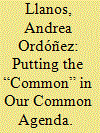

|
|
|
| 7 |
ID:
184091
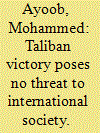

|
|
|
|
|
| Summary/Abstract |
At the very outset, I want to set to rest the myth that the Taliban takeover of Afghanistan poses a challenge to the international system as presently constituted. In fact, exactly the opposite is the case, for this event reinforces the Westphalian logic that, despite recent attempts to chip away at it, continues to form the basis of international order.
|
|
|
|
|
|
|
|
|
|
|
|
|
|
|
|
| 8 |
ID:
184648
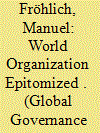

|
|
|
|
|
| Summary/Abstract |
Brian Urquhart was the second person to enter the international civil service of the United Nations. He witnessed the creation of the world organization at close range, played an important part in the invention of what later on would be labeled the “Blue Helmets,” worked closely with the first five Secretaries-General and rose to under-secretary-general himself. Even after his retirement in 1986, he remained a source of counsel and advice for those engaged in the efforts to organize an ever changing and difficult world. His death at the age of 101 marks the passing of the “first generation”
|
|
|
|
|
|
|
|
|
|
|
|
|
|
|
|